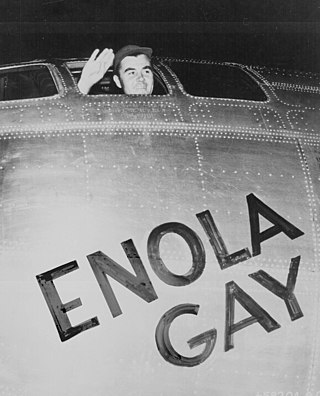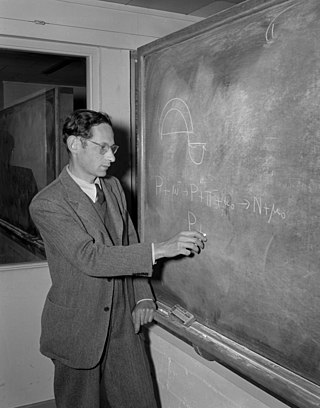Related Research Articles

The Enola Gay is a Boeing B-29 Superfortress bomber, named after Enola Gay Tibbets, the mother of the pilot, Colonel Paul Tibbets. On 6 August 1945, during the final stages of World War II, it became the first aircraft to drop an atomic bomb in warfare. The bomb, code-named "Little Boy", was targeted at the city of Hiroshima, Japan, and caused the destruction of about three quarters of the city. Enola Gay participated in the second nuclear attack as the weather reconnaissance aircraft for the primary target of Kokura. Clouds and drifting smoke resulted in Nagasaki, a secondary target, being bombed instead.

International Physicians for the Prevention of Nuclear War (IPPNW) is a non-partisan federation of national medical groups in 63 countries, representing doctors, medical students, other health workers, and concerned people who share the goal of creating a more peaceful and secure world free from the threat of nuclear annihilation. The organization's headquarters is in Malden, Massachusetts. IPPNW was awarded the Nobel Peace Prize in 1985.

Mitsubishi Heavy Industries, Ltd. is a Japanese multinational engineering, electrical equipment and electronics corporation headquartered in Tokyo, Japan. MHI is one of the core companies of the Mitsubishi Group and its automobile division is the predecessor of Mitsubishi Motors.

Barbara Kingsolver is a Pulitzer Prize-winning American novelist, essayist, and poet. Her widely known works include The Poisonwood Bible, the tale of a missionary family in the Congo, and Animal, Vegetable, Miracle, a nonfiction account of her family's attempts to eat locally. In 2023, she was awarded the Pulitzer Prize for Fiction for the novel Demon Copperhead. Her work often focuses on topics such as social justice, biodiversity, and the interaction between humans and their communities and environments.

Hibakusha is a word of Japanese origin generally designating the people affected by the atomic bombings of Hiroshima and Nagasaki at the end of World War II.

Robert Serber was an American physicist who participated in the Manhattan Project. Serber's lectures explaining the basic principles and goals of the project were printed and supplied to all incoming scientific staff, and became known as The Los Alamos Primer. The New York Times called him “the intellectual midwife at the birth of the atomic bomb.”

Norman Cousins was an American political journalist, author, professor, and world peace advocate.

Marilynne Summers Robinson is an American novelist and essayist. Across her writing career, Robinson has received numerous awards, including the Pulitzer Prize for Fiction in 2005, National Humanities Medal in 2012, and the 2016 Library of Congress Prize for American Fiction. In 2016, Robinson was named in Time magazine's list of 100 most influential people. Robinson began teaching at the Iowa Writers' Workshop in 1991 and retired in the spring of 2016.

William Leonard Laurence was a Jewish American science journalist best known for his work at The New York Times. Born in the Russian Empire, he won two Pulitzer Prizes. As the official historian of the Manhattan Project, he was the only journalist to witness the Trinity test and the atomic bombing of Nagasaki. He is credited with coining the iconic term "Atomic Age," which became popular in the 1950s. Infamously, he dismissed the destructive effects of radiation sickness as Japanese propaganda in The New York Times. Even though he had seen the effects first-hand, he had been on the War Department payroll, and was asked by United States military officials to do so in order to discredit earlier reports by independent journalist Wilfred Burchett, the first reporter on-site after the bombings.

Benjamin S. Lerner is an American poet, novelist, essayist, critic and teacher. The recipient of fellowships from the Fulbright, Guggenheim, and MacArthur Foundations, Lerner has been a finalist for the National Book Award for Poetry and the Pulitzer Prize for Fiction. Lerner teaches at Brooklyn College, where he was named a Distinguished Professor of English in 2016.

Andrew Solomon is an American writer on politics, culture and psychology, who lives in New York City and London. He has written for The New York Times, The New Yorker, Artforum, Travel and Leisure, and other publications on a range of subjects, including depression, Soviet artists, the cultural rebirth of Afghanistan, Libyan politics, and Deaf politics.

Atomic tourism or nuclear tourism is a recent form of tourism in which visitors learn about the Atomic Age by traveling to significant sites in atomic history such as nuclear test reactors, museums with nuclear weapon artifacts, delivery vehicles, sites where atomic weapons were detonated, and nuclear power plants.

Martin Jay Sherwin was an American historian. His scholarship mostly concerned the history of nuclear weapons and nuclear proliferation. He served on the faculty at Princeton University, the University of Pennsylvania, the University of California, Berkeley, and as the Walter S. Dickson Professor of English and American History at Tufts University, where he founded the Nuclear Age History and Humanities Center.

On 6 and 9 August 1945, the United States detonated two atomic bombs over the Japanese cities of Hiroshima and Nagasaki respectively. The bombings killed between 129,000 and 226,000 people, most of whom were civilians, and remain the only use of nuclear weapons in an armed conflict. Japan surrendered to the Allies on 15 August, six days after the bombing of Nagasaki and the Soviet Union's declaration of war against Japan and invasion of Japanese-occupied Manchuria. The Japanese government signed the instrument of surrender on 2 September, effectively ending the war.

Sumiteru Taniguchi was a survivor of the 1945 atomic bombing of Nagasaki, a prominent activist for a treaty prohibiting nuclear weapons, and chairman of the Nagasaki Council of A-Bomb Sufferers.

Bockscar, sometimes called Bock's Car, is the name of the United States Army Air Forces B-29 bomber that dropped a Fat Man nuclear weapon over the Japanese city of Nagasaki during World War II in the second – and most recent – nuclear attack in history. One of 15 Silverplate B-29s used by the 509th, Bockscar was built at the Glenn L. Martin Aircraft Plant at Bellevue, Nebraska, at what is now Offutt Air Force Base, and delivered to the United States Army Air Forces on 19 March 1945. It was assigned to the 393rd Bombardment Squadron, 509th Composite Group to Wendover Army Air Field, Utah in April and was named after captain Frederick C. Bock.

The Dayton Literary Peace Prize is an annual United States literary award "recognizing the power of the written word to promote peace" that was first awarded in 2006. Awards are given for adult fiction and non-fiction books published at some point within the immediate past year that have led readers to a better understanding of other peoples, cultures, religions, and political views, with the winner in each category receiving a cash prize of $10,000. The award is an offshoot of the Dayton Peace Prize, which grew out of the 1995 peace accords ending the Bosnian War. In 2011, the former "Lifetime Achievement Award" was renamed the Richard C. Holbrooke Distinguished Achievement Award with a $10,000 honorarium.

Strategic bombing is the use of airpower to destroy industrial and economic infrastructure—such as factories, oil refineries, railroads, or nuclear power plants—rather than just directly targeting military bases, supply depots, or enemy combatants. Strategic bombing may also include the intent to dehouse, demoralize, or inflict civilian casualties, and thus hinders them from supporting the enemy's war effort. The bombing can be utilized by strategic bombers or missiles, and may use general-purpose bombs, guided bombs, incendiary devices, chemical weapons, biological weapons, or nuclear weapons.

The Bomb is a 2015 American documentary film about the history of nuclear weapons, from theoretical scientific considerations at the very beginning, to their first use on August 6, 1945, to their global political implications in the present day. The film was written and directed by Rushmore DeNooyer for PBS. The project took a year and a half to complete, since much of the film footage and images were only recently declassified by the United States Department of Defense.

Viet Thanh Nguyen is a Vietnamese-American professor and novelist. He is the Aerol Arnold Chair of English and Professor of English and American Studies and Ethnicity at the University of Southern California.
References
- ↑ Yin, Maryann (October 11, 2016). "2016 Dayton Literary Peace Prize Winners and Runner-ups Unveiled". Adweek . Archived from the original on December 27, 2023. Retrieved December 27, 2023.
- ↑ "Susan Southard, Nikolaus Wachsmann and Steve Luxenberg Named Winners of the 2016 J. Anthony Lukas Prize Project Awards". Nieman Foundation. 2016-03-30. Retrieved 2017-10-29.
- ↑ Susan Southard (2015-08-07). "Nagasaki, the Forgotten City". New York Times. Retrieved 2017-10-29.
- ↑ Susan Southard. "Susan Southard, About" . Retrieved 2017-10-29.
- ↑ Susan Southard (2017-08-09). "72 years after the bombing of Nagasaki, there are 15,000 nuclear weapons in the world". Los Angeles Times. Retrieved 2017-10-29.
- ↑ Buruma, Ian (2015-07-28). "'Nagasaki: Life After Nuclear War,' by Susan Southard". The New York Times. ISSN 0362-4331 . Retrieved 2017-05-30.
- ↑ Louise Steinman (2015-07-24). "Susan Southard's 'Nagasaki' faces nuclear horror as the 70th anniversary of the bombing approaches". Los Angeles Times. ISSN 0458-3035 . Retrieved 2017-05-30.
- ↑ "'Nagasaki: Life After Nuclear War,' by Susan Southard". SFGate. 2015-07-31. Retrieved 2017-05-30.